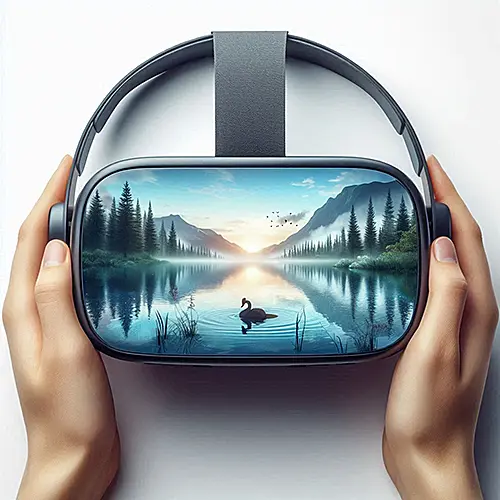
In a world where addiction continues to devastate countless lives, a new, innovative tool has emerged from a university-based startup, promising to revolutionize the way we approach drug addiction treatment. This tool leverages the power of virtual reality (VR) to create immersive, therapeutic experiences that help individuals combat addiction. As technology and medicine continue to intersect, this groundbreaking approach offers hope and a fresh perspective on tackling one of society’s most pressing issues.
The Promise of Virtual Reality in Addiction Treatment
Virtual reality is no longer confined to the realms of gaming and entertainment. Its applications have expanded into various fields, including education, training, and now, healthcare. The university-based startup behind this new tool has harnessed VR’s potential to create a unique and effective method for treating drug addiction. By immersing patients in a controlled virtual environment, therapists can simulate real-world scenarios that trigger cravings and addictive behaviors, allowing patients to confront and manage these impulses in a safe and supportive setting.
How It Works
The VR tool operates by creating customized virtual environments tailored to each patient’s specific triggers and experiences. These environments can range from a party where drugs are present to a stressful situation that might typically lead to substance abuse. By repeatedly exposing patients to these scenarios in a controlled manner, they can develop coping strategies and resilience against their cravings. This method, known as exposure therapy, has been proven effective in treating other conditions like PTSD and phobias, and now, it shows great promise for addiction treatment as well.
Enhancing Traditional Therapy
One of the most significant advantages of this VR tool is its ability to complement traditional therapy methods. While counseling and medication remain crucial components of addiction treatment, the addition of VR provides an interactive and engaging element that can enhance the overall therapeutic process. Patients can practice their coping skills in a realistic but safe environment, making them better prepared to face real-life challenges. This hands-on approach can lead to more profound and lasting behavioral changes.
Accessibility and Scalability
The university-based startup has also focused on making this VR tool accessible and scalable. By developing affordable and user-friendly VR headsets, they aim to ensure that this innovative treatment is available to a broad audience. Additionally, the tool is designed to be used in various settings, from clinical environments to patients’ homes. This flexibility allows for continuous support and therapy, even outside of traditional treatment centers, making it easier for individuals to stay committed to their recovery journey.
Positive Early Results
Early trials of this VR-based treatment have shown promising results. Patients have reported reduced cravings and improved coping mechanisms, leading to decreased relapse rates. Furthermore, the immersive nature of VR has made therapy sessions more engaging and enjoyable for patients, increasing their motivation to participate. As the tool continues to be refined and tested, these positive outcomes are expected to grow, offering new hope for those struggling with addiction.
Collaborative Effort and Ongoing Research
The development of this VR tool is a testament to the power of collaboration between academia, technology, and healthcare. Researchers, engineers, and medical professionals have worked together to create a cutting-edge solution that addresses a critical need. Ongoing research and trials will continue to optimize the tool, ensuring it evolves in line with the latest scientific findings and technological advancements. This collaborative approach not only enhances the tool’s effectiveness but also fosters a holistic understanding of addiction and its treatment.
Personalization and Data-Driven Insights
One of the most exciting aspects of this VR tool is its ability to personalize treatment for each patient. By collecting data on patients’ responses to various virtual scenarios, therapists can gain valuable insights into their specific triggers and progress. This data-driven approach allows for the continuous adaptation and improvement of treatment plans, ensuring they remain effective over time. Personalized therapy is more likely to resonate with patients, leading to better outcomes and sustained recovery.
Challenges and Future Directions
While the potential of this VR tool is immense, it is not without its challenges. One significant hurdle is ensuring that patients have access to the necessary technology. Although the startup has focused on affordability, there are still barriers to widespread adoption, particularly in underserved communities. Additionally, while early results are promising, extensive clinical trials are needed to validate the tool’s long-term efficacy and safety fully.
Looking ahead, the future of this VR-based addiction treatment is bright. As technology continues to advance, we can expect even more sophisticated and immersive virtual environments that further enhance the therapeutic experience. Moreover, as the tool gains recognition and acceptance within the medical community, it will likely become an integral part of comprehensive addiction treatment programs.
A New Hope for Addiction Recovery
In conclusion, the emergence of this VR tool from a university-based startup represents a significant leap forward in addiction treatment. By leveraging the power of virtual reality, this innovative approach offers a unique and effective way to help individuals combat drug addiction. With its ability to create personalized, immersive experiences, enhance traditional therapy, and provide valuable data-driven insights, this VR tool has the potential to revolutionize the field of addiction treatment. As research and development continue, we can look forward to a future where technology and therapy work hand in hand to provide new hope and healing for those struggling with addiction.